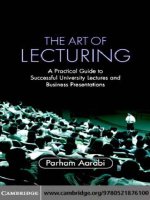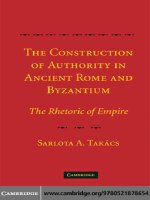0521874548 cambridge university press hegels phenomenology of spirit a critical guide jun 2008
Bạn đang xem bản rút gọn của tài liệu. Xem và tải ngay bản đầy đủ của tài liệu tại đây (1.32 MB, 259 trang )
This page intentionally left blank
Hegel’s Phenomenology of Spirit
Hegel’s Phenomenology of Spirit, first published in 1807, is a work with few
equals in systematic integrity, philosophical originality, and historical
influence. This collection of newly commissioned essays, contributed by
leading Hegel scholars, examines all aspects of the work, from its argumentative strategies to its continuing relevance to philosophical debates
today. The collection combines close analysis with wide-ranging coverage
of the text, and also traces connections with debates extending beyond
Hegel scholarship, including issues in the philosophy of language, philosophy of mind, philosophy of action, ethics, and philosophy of religion. In
showing clearly that we have not yet exhausted the Phenomenology’s
insights, it demonstrates the need for contemporary philosophers to engage
with Hegel.
is Assistant Professor in the Department of Philosophy at
Johns Hopkins University.
DEAN MOYAR
is Professor in the Department of Philosophy at the
University of Cologne. He is author of Hegel’s Concept of Action (2004).
MICHAEL QUANTE
CAMBRIDGE CRITICAL GUIDES
Volumes published in the series thus far:
Hegel’s Phenomenology of Spirit
EDITED BY DEAN MOYAR AND MICHAEL QUANTE
HEGEL’S
Phenomenology of Spirit
A Critical Guide
EDITED BY
DEAN MOYAR
AND
MICHAEL QUANTE
CAMBRIDGE UNIVERSITY PRESS
Cambridge, New York, Melbourne, Madrid, Cape Town, Singapore, São Paulo
Cambridge University Press
The Edinburgh Building, Cambridge CB2 8RU, UK
Published in the United States of America by Cambridge University Press, New York
www.cambridge.org
Information on this title: www.cambridge.org/9780521874540
© Cambridge University Press 2008
This publication is in copyright. Subject to statutory exception and to the provision of
relevant collective licensing agreements, no reproduction of any part may take place
without the written permission of Cambridge University Press.
First published in print format 2008
ISBN-13 978-0-511-39849-0
eBook (EBL)
ISBN-13
hardback
978-0-521-87454-0
Cambridge University Press has no responsibility for the persistence or accuracy of urls
for external or third-party internet websites referred to in this publication, and does not
guarantee that any content on such websites is, or will remain, accurate or appropriate.
Contents
Notes on the contributors
Preface
List of abbreviations and citations
page vii
xi
xvii
1 Substance, subject, system: the justification of science
in Hegel’s Phenomenology of Spirit
DIETMAR H. HEIDEMANN
1
2 ‘‘Science of the phenomenology of spirit’’: Hegel’s program
and its implementation
HANS-FRIEDRICH FULDA
21
3 The Phenomenology of Spirit as a ‘‘transcendentalistic’’ argument
for a monistic ontology
ROLF-PETER HORSTMANN
43
4 Sense-certainty and the ‘‘this-such’’
WILLEM A. DEVRIES
63
5 From desire to recognition: Hegel’s account of human sociality
AXEL HONNETH
76
6 ‘‘Reason . . . apprehended irrationally’’: Hegel’s critique
of Observing Reason
MICHAEL QUANTE
91
7 What is a ‘‘shape of spirit’’?
TERRY PINKARD
112
8 Ethical life, morality, and the role of spirit
in the Phenomenology of Spirit
WILL DUDLEY
130
v
Contents
vi
9 Self-completing alienation: Hegel’s argument for
transparent conditions of free agency
DEAN MOYAR
150
10 Practical reason and spirit in Hegel’s Phenomenology
of Spirit
LUDWIG SIEP
173
11 Religion and demythologization in Hegel’s
Phenomenology of Spirit
THOMAS A. LEWIS
192
12 The ‘‘logic of experience’’ as ‘‘absolute knowledge’’ in Hegel’s
Phenomenology of Spirit
ROBERT B. PIPPIN
210
Bibliography
Index
228
237
Notes on the contributors
W I L L E M A . D E V R I E S is Professor of Philosophy at the University of New
Hampshire. His books include Hegel’s Theory of Mental Activity (1988);
Knowledge, Mind, and the Given: A Reading of Sellars’ ‘‘Empiricism and the
Philosophy of Mind’’ (with Timm Triplett) (2000); and Wilfrid Sellars,
Philosophy Now Series (2005).
W I L L D U D L E Y is Associate Professor of Philosophy at Williams College.
He is the author of Hegel, Nietzsche, and Philosophy: Thinking Freedom
(2002) and Understanding German Idealism (2007). He is the recipient
of fellowships from the Humboldt Foundation and the American Council
of Learned Societies, and a former Vice-President of the Hegel Society of
America.
HANS-FRIEDRICH
is Professor Emeritus, Department of
Philosophy, University of Heidelberg. His books include Das Problem
einer Einleitung in Hegels Logik (1965; 2nd edn., 1975) and Hegel (2003).
He also gave the Laudatio for Donald Davidson upon receiving the HegelPrize of the City of Stuttgart, ‘‘Unterwegs zu einer einheitlichen Theorie
des Sprechens,’’ published in Dialektik und Dialog (1993).
FULDA
DIETMAR H. HEIDEMANN
is Assistant Professor of Philosophy at Hofstra
University. His books include Kant und das Problem des metaphysischen
Idealismus (1998); Der Begriff des Skeptizismus (2007); Hegel und die
Geschichte der Philosophie (co-editor, 2007). His articles include ‘‘Kann
man sagen, was man meint?,’’ Archiv fu¨r Geschichte der Philosophie (2002);
‘‘Indexikalita¨t und sprachliche Selbstreferenz bei Hegel,’’ Hegel-Studien
(2004–5); and ‘‘Manifestes und wissenschaftliches Weltbild,’’ Internationale
Zeitschrift fu¨r Philosophie (2005). He is the editor of the Kant Yearbook.
A X E L H O N N E T H is Professor of Social Philosophy, Johann Wolfgang
Goethe-University and Director of the Institute for Social Research,
Frankfurt am Main. His publications include Kritik der Macht (1985);
vii
viii
Notes on the contributors
Die zerrissene Welt des Sozialen: Sozialphilosophische Aufsa¨tze (1989); Kampf
um Anerkennung (1992); Desintegration. Bruchstu¨cke einer soziologischen
Zeitdiagnose (1994); Das Andere der Gerechtigkeit (2000); Leiden an
Unbestimmtheit: Reaktualisierung der Hegelschen Rechtsphilosophie (2001);
Unsichtbarkeit (2003); Verdinglichung: Eine anerkennungstheoretische Studie
(2005); Umverteilung oder Anerkennung: Eine politisch-philosophische
Kontroverse (with Nancy Fraser, 2003).
ROLF-PETER HORSTMANN
is Professor of Philosophy at the Humboldt
University in Berlin. He is author of Ontologie und Relationen: Hegel,
Bradley, Russell und die Kontroverse u¨ber interne und externe Beziehungen
(1984); Bausteine Kritischer Philosophie (1997); and Die Grenzen der Vernunft:
eine Untersuchung zu Zielen und Motiven des Deutschen Idealismus (3rd edn.,
2000). He has co-edited Hegel, Jenaer Systementwu¨rfe. He has also co-edited
collections of works on Kant, transcendental arguments, Rousseau,
aesthetics, Hegel, and German Idealism. He is currently serving as editor
for a new translation of Nietzsche’s Beyond Good and Evil.
THOMAS A. LEWIS
is the Vartan Gregorian Assistant Professor in the
Department of Religious Studies at Brown University. He is the author of
Freedom and Tradition in Hegel: Reconsidering Anthropology, Ethics, and
Religion (2005) and numerous articles on Hegel, ethics, and the philosophy
of religion. He is currently completing a book on religion, modernity, and
politics in Hegel.
D E A N M O Y A R is Assistant Professor in the Department of Philosophy at
Johns Hopkins University. He is the editor of the forthcoming Routledge
Companion to Nineteenth Century Philosophy. He is currently completing a
manuscript entitled Hegel’s Conscience.
is Professor of Philosophy at Georgetown University. His
publications include Democratic Liberalism and Social Union (1987); Hegel’s
Dialectic: The Explanation of Possibility (1988); Hegel’s Phenomenology:
The Sociality of Reason (1994); Hegel: A Biography (2000); and German
Philosophy 1760–1860 (2002). He is the editor of a new collection of
Heinrich Heine’s work and is currently working on a new translation of
the Phenomenology of Spirit.
TERRY PINKARD
R O B E R T B . P I P P I N is the Evelyn Stefansson Nef Distinguished Service
Professor in the Committee on Social Thought, the Department of
Philosophy, and the College at the University of Chicago. He is the
author of several books and articles on German idealism and later
Notes on the contributors
ix
German philosophy, including Kant’s Theory of Form (1982); Hegel’s
Idealism: The Satisfactions of Self-Consciousness (1989); Modernism as a
Philosophical Problem (1991); and Idealism as Modernism: Hegelian
Variations (1997).
M I C H A E L Q U A N T E is Professor, Department of Philosophy, University of
Cologne, Director of the Institute for Ethics in the Life Sciences, University
of Cologne, and Co-Director of the Husserl-Archive of the University of
Cologne. His publications include Hegels Begriff der Handlung (1993; English,
2004); Ethik der Organtransplantation (co-author, 2000); Personales Leben
und menschlicher Tod (2002); Einfu¨hrung in die Allgemeine Ethik (2nd edn.,
2006); Enabling Social Europe (co-author, 2005); Person (2007).
¨ nster. He
L U D W I G S I E P is Professor of Philosophy at the University of Mu
is the author of Hegels Fichtekritik und die Wissenschaftslehre von 1804 (1970);
Anerkennung als Prinzip der praktischen Philosophie (1979); Praktische
Philosophie im Deutschen Idealismus (1992); Der Weg der Pha¨nomenologie
des Geistes (2nd edn., 2001); Konkrete Ethik (2004); editor of G. W. F. Hegel,
Grundlinien der Philosophie des Rechts (2nd edn., 2005); co-editor with
W. Jaeschke of the yearbook Hegel-Studien (since 2003); and co-editor with
Ch. Halbig and M. Quante of Hegels Erbe (2004).
Preface
The Phenomenology of Spirit has just turned two hundred years old. The
first book that Georg Wilhelm Friedrich Hegel published has lost none of
the inspirational force that it had not only in Hegel’s lifetime but, above all,
in the decades after his death. The Russian e´migre´ author Alexander
Herzen, writing about the intellectual scene in France in the 1840s, reports
the following:
Proudhon often went there to listen to Reichel’s Beethoven and Bakunin’s Hegel:
the philosophical discussions lasted longer than the symphonies. They reminded
me of the famous all-night vigils of Bakunin and Khomyakov at Chaadayev’s and
at Madame Yelagin’s, where Hegel was also discussed. In 1847 Karl Vogt, who also
lived in the Rue de Bourgogne, and often visited Reichel and Bakunin, was bored
one evening with listening to the endless discussions of the Phenomenology, and
went home to bed. Next morning he went round for Reichel, for they were to go to
the Jardin des Plantes together; he was surprised to hear conversation in Bakunin’s
study at that early hour. He opened the door – Proudhon and Bakunin were
sitting in the same places before the burnt-out embers in the fireplace, and were
with a few last words just finishing the dispute that had begun the day before.1
The power of the Phenomenology to stimulate new thought and provoke
philosophical innovation continues unbroken today. It has enjoyed the
widest and most intense reception of all Hegel’s work. There are many
reasons that the Phenomenology of Spirit has had such a wide impact and
that, over such a long period, it has been the ever-renewed subject of
intense discussion. In the nineteenth century the primary reasons were,
of course, political, as in no other text does Hegel’s dialectic hold out more
1
Alexander Herzen (1982), 422. The people referred to in the Herzen quote are: Pierre-Joseph
Proudhon (1809–1865), French utopian socialist – author of the famous quote that ‘‘property is
theft’’; Adolf Reichel (1817–1897), German composer; Michail Alexandrowitsch Bakunin (1814–1876),
Russian anarchist and antagonist of Karl Marx; Alexey Stepanovitsch Khomyakov (1804–60),
Russian poet; Pyotr Yakovlevitsch Chaadayev (1794–1856), Russian philosopher and writer;
Avdotya Petrovna Yelagin (1789–1877), famous through her literary salon in Moscow in the 1830s
and 1840s; Karl Vogt (1817–1895), German scientist and materialist. Translation altered.
xi
xii
Preface
promise of demonstrating how political reality can be transformed. Yet the
revolutionary ethos of the Phenomenology is only one among the many
features that have contributed, and still contribute, to its legacy. In this
brief introduction we would like to distinguish three features of the text
that have contributed to its overall appeal, and three philosophical themes
of the Phenomenology that remain very much alive today.
First, Hegel treats in this work an astounding wealth of material that one
cannot find (at least, not in the primary text) in the Science of Logic or in the
three editions of the Encyclopedia or in the Philosophy of Right. The sheer
breadth of the spectrum of phenomena and ‘‘objects’’ is overwhelming,
running from the semantics of deictic reference in sense perception to
absolute knowledge, and from the ethical, religious, and aesthetic selfconceptions of the ancients to the ‘‘modern’’ natural sciences and their
disenchanted view of the world. This wide-ranging ‘‘path’’ of the
Phenomenology is no doubt responsible for the text having found an
audience beyond Hegel experts and those engaged with traditional philosophical questions. The most famous and influential theme, the ‘‘struggle
for recognition,’’ which attracted the early left-Hegelians as an analysis of
social conflicts, remains a current theme for philosophers and political
theorists, and has also provoked innovative interpretations by psychologists, literary critics, and sociologists.
Second, Hegel conceived of the Phenomenology as a text that could stand
on its own, something which can otherwise be said only of his Science of
Logic, since both the Encyclopedia and the Philosophy of Right depict Hegel’s
thoughts in outline and require explication through spoken lectures. In
contrast to the ‘‘greater Logic’’ the Phenomenology appears less abstract,
more accessible, and more open to the reader who does not want to go into
the fine structure of speculative thinking. In addition, Hegel’s argumentation in the Phenomenology is not yet overloaded with the speculative
philosophical conceptual apparatus that in the eyes of many critics suffocates the phenomena in the later work. For many readers, it is only in this
early text that Hegel’s thinking is still close enough to the phenomena to
illuminate their meaning.
The third general reason for the lasting success of the Phenomenology is
that in this work Hegel brings together two seemingly countervailing
tendencies of thought. On the one side is the incredible philosophical
aspiration to give a phenomenological account of everything. Hegel’s aim
of providing necessary connections between each and every shape of
consciousness stirs the philosophically interested reader to reconstruct his
argument or to find a gap in his reasoning. Hegel’s self-assurance in the
Preface
xiii
power of his arguments, and his unbroken trust in the capabilities of
philosophical thinking to explain the world, must appear to us today highly
provoking, or at least irritating. The fascination and the strangeness of the
Phenomenology comes also from the difference between his time and our
own with regard to both the cultural understanding of philosophy and the
dominant view of the nature of the philosophical undertaking itself. For
Hegel, the idea of philosophy as the highest and most important cultural
form was grounded in the actual (high) culture of his time. So, too, his
belief that the true philosophy had to be systematic and had to encompass
everything was widely shared among philosophers. Our cultural and
philosophical self-understandings have changed, and we are no longer so
optimistic about the power or desirability of philosophic system-building.
But, on the other side, the Phenomenology is also a deep engagement with
the skeptical tendency that has accompanied Western philosophy from the
beginning, and it therefore always seems one step ahead of the critics of
idealism. The way in which Hegel develops his own answer to the skeptical
demand, by co-opting it for his method and showing how it ‘‘completes,’’
and therefore overcomes, itself is highly original. The experience of consciousness is the pathway of despair that nevertheless leads to the ‘‘spiritual
daylight’’ and the liberation of self-knowledge. From the interplay of these
two sides Hegel’s argumentation radiates a spiritual energy that has
retained its splendor; the dust of centuries has not been able to cloud the
brilliance of the phenomenological ‘‘movement.’’
The first of the three main philosophical reasons represented in this
volume for the continued importance of the Phenomenology has to do with
the particular kind of holism that Hegel attempts to establish. Although
there are not many philosophers today who would endorse the grand
system-building that Hegel thought necessary, holistic strategies of justification are quite popular and appear likely to become even more widely
accepted. This tendency has much to do with the demise of foundationalist
programs of tracing claims of knowledge back to one or more basic
indubitable sources. Hegel’s alternative to foundationalism does not fit
neatly into the mold of contemporary coherentism, and just what exactly
his strategy amounts to turns largely on how one reads the Phenomenology
and its goal of providing a ‘‘ladder’’ to speculative philosophy. One of the
promises of the Phenomenology is that it can deliver an argument for why
holism is the only sound metaphilosophical position, to do so as a sustained
argument against every form of foundationalist claim to immediate knowledge, and yet to achieve a positive position that has overcome all forms of
skepticism. Hegel thought that only an idealism of a very radical sort could
xiv
Preface
make this strategy work, and no doubt many present-day skeptics would
say that Hegel’s cure is much worse than the disease. Yet Hegel’s systematic
solution remains a promising epistemological approach that can deliver
results at both the overall level and through the specific arguments in the
‘‘local’’ argumentative movements between shapes of consciousness and
their claims to knowledge.
The second point concerns Hegel’s ingenious response to the perennial
problem of the relation of the natural and the normative. With the
remarkable success of the natural sciences in the past two centuries, both
the promises and the threats of various kinds of philosophical explanation
oriented by the ‘‘hard sciences’’ have dramatically increased. Programs of
reductive naturalism abound in Anglo-American philosophy today, and
lively debates are taking place over the limits of such programs for understanding the mind and ethics (to name only two). Hegel’s idealistic program was born out of the perceived insufficiencies of Kant’s transcendental
or critical idealism, which sought to restrict the realm of natural explanation to the domain of spatio-temporal appearances. The problems of
Kant’s peculiar kind of dualism are too vast even to summarize here, but
the central issue that arose in the first two decades of reception and transformation of Kantian idealism was the issue of how to provide a unified
account of nature and freedom while maintaining the relative independence of each. In the concept of Spirit, and in the overall architecture of his
System, Hegel claimed to have achieved this result, providing a theory of
the emergence of freedom from the natural that did not reduce freedom to
nature. Just how he accomplished this feat, and whether he actually
accomplished it, continues to be a central aspect of scholarly work on
Hegel’s texts. While not offering Hegel’s full story on this question, the
Phenomenology remains the best point of entry into his critique of certain
kinds of naturalism and into his own answer to how freedom is possible
beginning from within the natural processes of ‘‘life.’’
Finally, a great attraction of the Phenomenology, and a source of some
puzzlement, is that within its method of experience it treats both theoretical and practical stances, both claims of knowledge (in a narrow sense) and
claims of action. Philosophy of action has been among the most vibrant
areas of philosophy in the past fifty years. This includes both questions of
how we distinguish actions from mere events, and how practical reasoning
undergirds ethical and political philosophy. So, too, a rebirth of pragmatism in a variety of forms has led to an interest in exploring the interconnections of action and knowledge. The famous Chapter IV of the
Phenomenology is only the most obvious site where Hegel’s epistemology
Preface
xv
and his action theory intersect. At nearly every stage of the text, Hegel
thematizes what consciousness does with its concepts, and the endpoint or
endpoints of the account in one way or another all describe a practical
process. The Phenomenology therefore offers not only a series of reflections
on the practical nature of any knowledge claim, but also detailed accounts
of the more explicit contexts of action.
The Phenomenology rewards persistent study, but it also makes serious, at
times even outrageous demands on the reader (the literary scholar M. H.
Abrams only exaggerated a little when he claimed that Joyce’s Finnegan’s
Wake is an easy read by comparison). In addition to the fact that two
hundred years have created both a language barrier (even for German
scholars) and a formidable distance from the original philosophical context, other difficulties are the complicated Hegelian idiom, the wealth of
the specific material, and, last but not least, the complex arrangement of
the philosophical argumentation. Hegel not only operates with concepts
and figures of thought that were familiar to the philosophical discourse of
his time, but which today’s reader can comprehend only with difficulty
(and small steps), he also develops a self-sufficient and unprecedented
philosophical method. His argumentative strategies work on different
levels and constantly intermingle before coalescing in the end.
One result of all of these difficulties is that interpretations of both
individual passages of the Phenomenology and of the work as a whole
diverge greatly, and there is hardly any point where one could say that no
fundamental conflicts exist among interpreters. It would be pointless to go
into detail here about the various modes of reception and traditions of
interpretation, since these have been discussed in many commentaries (one
need only compare the comments in the contributions and in the bibliography of this volume). We should note that some differences in interpretation can be identified between distinct nationalities, testifying to the
ability of the text to appeal across philosophical traditions. Among the
ideas behind this volume was to bring together scholars from America and
Germany to enact a productive dialogue between the often very different
styles of interpretation in the two countries.
Our primary goal was to put together a volume about the Phenomenology
that would highlight and clarify central passages and questions. The contributors were asked to accomplish two tasks. The first was to make the
reader’s confrontation with the Hegelian text easier by drawing out the
arguments from the complex dialectical structure. The second aim was to
bring out why Hegel’s treatment of the question(s) is still of systematic
interest from today’s perspective (or why certain aspects are no longer
xvi
Preface
salvageable). The result of this program is a collection that focuses less on
the origins of Hegel’s project than on its systematic integrity and the
viability of specific analyses for today’s more specialized branches of
philosophy.
We refrain here from summarizing the interpretive results of the individual contributions. Each contribution must – and, we think, can – speak
for itself. As editors we are (painfully) aware that this volume could not
come close to covering all that can be learned or systematically developed
from the Phenomenology today. The breadth of Hegel’s work and the
complexity of his arguments are simply too great for an exhaustive treatment to be possible. Nevertheless we are confident that this collection will
put the reader in a position to gain access to the entire wealth of Hegel’s
Phenomenology. For that we would like to thank the contributors, who in
the midst of their many other commitments invested their energy in this
volume. Finally, we would like to thank Cambridge University Press for
incorporating this project into their new series.
Abbreviations and citations
All references to the text of the Phenomenology are given in parentheses in
the main text. The notes give the page number of the German edition from
the Gesammelte Werke, volume 9, followed by the paragraph number from the
English translation of A. V. Miller: (18, {17), for example. We expect that
Miller’s translation will soon be superseded, and that subsequent translations will also employ paragraph numbers. Many of the translations have
also been altered by the authors of the chapters: it proved too cumbersome
to note all of these changes.
J. G. FICHTE
Sa¨mmtliche Werke (SW), ed. I. H. Fichte. Berlin: Walter de Gruyter, 1965
The System of Ethics (SE), eds. and trans. Daniel Breazeale and Gu¨nter
Zo¨ller. Cambridge: Cambridge University Press, 2005
G. W. F. HEGEL
Briefe von und an Hegel (Briefe), ed. J. Hoffmeister. Hamburg: Felix
Meiner Verlag, 1952–4; Hegel: The Letters, trans. C. Butler and
C. Seiler, with a commentary by C. Butler. Bloomington, IN: Indiana
University Press, 1984
Philosophy of History (PH), trans. J. Sibree. New York: Dover, 1956
Gesammelte Werke (GW), eds. Hartmut Buchner and Otto Po¨ggeler.
Hamburg: Felix Meiner Verlag, 1968–
Hegel’s Science of Logic (SL), trans. A. V. Miller. Atlantic Highlands, NJ:
Humanities Press, 1969
Philosophie des Rechts (PR). Frankfurt am Main: Suhrkamp Verlag, 1970
Wissenschaft der Logik (WL). Frankfurt am Main: Suhrkamp Verlag, 1970
Encyclopedia of the Philosophical Sciences (EPSIII), Vol. III, trans. William
Wallace. Oxford: Oxford University Press, 1971
xvii
xviii
Abbreviations and citations
Werke in zwanzig Ba¨nden (Werke), eds. Eva Moldenhauer and Karl Markus
Michel. Frankfurt am Main: Suhrkamp Verlag, 1971
Hegel’s Philosophy of Right (HPR), trans. T. M. Knox. Oxford: Clarendon,
1975
Faith and Knowledge (FK), trans. Walter Cerf and H. S. Harris. Albany,
NY: State University of New York Press, 1977
Phenomenology of Spirit (PhS), trans. A. V. Miller. Oxford: Oxford
University Press, 1977
Hegel’s Philosophy of Subjective Spirit (SS), ed. and trans. M. J. Petry, 3 vols.
Boston: D. Reidel, 1978
Vorlesungen u¨ber die Philosophie der Religion (VPR), ed. Walter Jaeschke,
3 vols. Hamburg: Felix Meiner Verlag, 1983–4
Lectures on the Philosophy of Religion (LPR), trans. R. F. Brown, P. C.
Hodgson, and J. M. Stewart, 3 vols. Berkeley: University of California
Press, 1984–7
Pha¨nomenlogie des Geistes (PhG), eds. H.-R. Wessels and H. Clairmont.
Hamburg: Felix Meiner Verlag, 1988
The Encyclopedia Logic (EL), trans. T. F. Geraets, W. A. Suchting, and
H. S. Harris. Indianapolis: Hackett, 1991
Elements of the Philosophy of Right (PR), ed. Allen W. Wood, trans. H. B.
Nisbet. Cambridge: Cambridge University Press, 1991
IMMANUEL KANT
Gesammelte Schriften (GS), ed. Royal Prussian (later German) Academy of
Science. Berlin: Walter de Gruyter, 1900–
Religion within the Limits of Reason Alone (Religion), trans. with an introd.
and notes T. M. Greene and H. H. Hoyt, with a new essay by J. R.
Silber. New York: Harper & Row, 1960
Groundwork for the Metaphysics of Morals (Groundwork), trans. H. J. Patton.
New York: Harper, 1964
Critique of Pure Reason (CPR), eds. and trans. P. Guyer and A. Wood.
Cambridge: Cambridge University Press, 1997
CHAPTER
1
Substance, subject, system: the justification of
science in Hegel’s Phenomenology of Spirit
Dietmar H. Heidemann
1
INTRODUCTION
More than thirty years ago Dieter Henrich expressed the view that Hegel’s
philosophical intentions are still more or less obscure. This view has been
very influential. Were it still true, then Robert Brandom’s observation with
regard to Hegel would be false, namely that ‘‘[t]raditions are lived forward
but understood backward.’’1 For in order to live or better to think the
Hegelian tradition forward and to understand Hegel backward, it is necessary to make sense of his philosophical intentions. Fortunately, research
has contributed a good deal of clarification to the situation so that nowadays Hegel is acknowledged as a contemporary interlocutor. The current
appreciation of Hegel’s thought goes especially for the Phenomenology of
Spirit. The ‘‘forward – backward’’ view might be regarded as the reason why
discussion of the Phenomenology during past decades basically followed three
lines of thought – a metaphysical, a transcendental, and a social one. Those
following the metaphysical line mainly concentrated on the metaphysical
conception of the Phenomenology as a systematic introduction to absolute
idealism. Accordingly the work is seen as offering a new way of providing
the possibility of metaphysics, which Hegel then develops in detail in
the Science of Logic.2 On the other side, those who advocated the transcendental line argued that Hegel’s philosophical intentions in the
Phenomenology should be understood from a broadly Kantian perspective,
since the work furthers the Kantian program of criticizing human knowledge by going beyond the original Kantian scope. Crucial to the argument of the Phenomenology is the transcendental idea that reflection
and self-consciousness fulfil the fundamental function of grounding
1
2
Brandom (2002a), 45. Cf. Henrich (1971), 7.
Taylor, for example, thinks the intention of the Phenomenology consists in ‘‘making the absolute
‘apparent’.’’ Cf. Taylor (1975), 128.
1
2
DIETMAR H. HEIDEMANN
knowledge.3 Followers of the social line argue that the Phenomenology aims
to demonstrate the social grounding of human rationality by focussing,
e.g., on the idea of the education and cultivation (‘‘Bildung’’) of the
modern European subject.4
It is not clear whether these alternatives of a metaphysical, transcendental,
and social interpretation of the Phenomenology of Spirit necessarily exclude
each other. Whatever the case, in current research a fourth possibility, of
approaching the Phenomenology epistemologically, has been favored. Most
recent books point out that though the work cannot be reduced to epistemological questions, the Phenomenology contains valuable discussions of
fundamental epistemological problems. In this respect one of the most
instructive treatises is Michael N. Forster’s comprehensive book Hegel’s
Idea of a Phenomenology of Spirit (1998).5 Forster distinguishes between
three fundamental tasks of the Phenomenology: a pedagogical, an epistemological, and a metaphysical one. The pedagogical task of the work is to teach
‘‘modern individuals to understand and accept Hegel’s system.’’ By way of
achieving its metaphysical task the Phenomenology develops the concept of
absolute spirit in its different communal dimensions. The epistemological
task, however, consists in (a) justifying Hegel’s system, (b) defending it
against the skeptical problem of ‘‘equipollence,’’ (c) defending it against
the skeptical problem of ‘‘concept-instantiation,’’ and (d) providing a proof
preferring it to all non-Hegelian positions.6 In this chapter I take this
epistemological approach to the Phenomenology of Spirit. I will argue that
the Preface as well as the Introduction of the Phenomenology provide a highly
sophisticated analysis of fundamental epistemological problems, especially
those concerning epistemic justification.
In order to understand the epistemological significance of the Phenomenology, it is necessary to give a brief outline of the general problem Hegel
is dealing with. Thus in section 2 of this chapter I sketch the introductory
function of the Phenomenology as an introduction to ‘‘true philosophical
science.’’ The introductory function makes clear why, in the Phenomenology, Hegel sees himself confronted with the problem of epistemic justification and skepticism. In section 3 I analyze Hegel’s central claims in the
3
4
5
6
Cf. Claesges (1981), 11. For the transcendental line, see especially Pippin’s influential book, Hegel’s
Idealism: ‘‘The satisfactions of Self-Consciousness’’ (Pippin 1989). Cf. also Hartmann (1976).
Cf. among others Pinkard (1994). For more recent research on the Phenomenology, see the helpful
annotated bibliography in Yovel (2005), 204–211.
Cf. also Westphal (2003), Rockmore (1997), and others; earlier epistemological interpretations of the
Phenomenology have already been proposed by Habermas (1973) and Solomon (1983).
Forster (1998), 11, 126 ff.
Substance, subject, system
3
Preface to the Phenomenology against the backdrop of this original problem. His first claim is to have comprehended and expressed ‘‘the True not
only as Substance but equally as Subject’’ (18, {17, all emphasis in the
original). His second claim is that ‘‘knowledge’’ can be presented only as
‘‘Science or as system’’ (21, {24). The basic feature of these central claims is
what can be called Hegel’s methodological anti-individualism, due to
which the justification of knowledge cannot be accomplished by using
the individual subject of epistemic certainty as a basic epistemic principle.
Section 4 then discusses Hegel’s alternative arguments for a theory of
epistemic justification in the Introduction to the Phenomenology. Since
Hegel thinks that knowledge cannot be justified independent of an epistemic standard, he develops two general arguments to solve the problem:
The first is an anti-skeptical argument from the self-creation of the epistemic standard; the second is a constructive argument from the history of
self-consciousness, that makes up the methodological frame for the entire
Phenomenology. My thesis is that though open questions remain, Hegel’s
solution to the problem of epistemic justification is a systematic epistemological conception that can contribute to the current debates in theoretical
philosophy.
2
HEGEL’S PROBLEM
2.1 Introducing science
In order to grasp Hegel’s intentions in the Preface it is necessary to make at
least some general remarks about the status of the Phenomenology in the
development of his philosophical thinking. First of all, in the Preface to the
Phenomenology Hegel specifies his philosophical program in the following
way: ‘‘To help to bring philosophy closer to the form of Science, to the goal
where it can lay aside the title ‘‘love of knowing’’ and be actual knowing –
that is what I have set myself to do’’ (11, {5). This program of bringing
philosophy closer to ‘‘the form of Science’’ is at first glance comparable to
what in early modern philosophy Descartes, for example, undertakes in the
Meditations when he attempts to renew philosophy’s foundations, or what
Kant undertakes in the Critique of Pure Reason by trying to set philosophy
on ‘‘the secure course of a science.’’7 However, in contrast to Descartes’
project of a prima philosophia or Kant’s critique of knowledge, Hegel’s
program in the Phenomenology must be understood primarily from within
7
Cf. Kant (CPR), B VII ff. (Preface).
4
DIETMAR H. HEIDEMANN
the author’s own intellectual development. Up to 1800 Hegel held a
position according to which the finite human mind is not capable of
acquiring knowledge of the absolute or God by philosophical reflection
or reason, but only by means of religious faith. That is to say, philosophy
itself is not the science of metaphysical knowledge in the proper sense of the
word, for it is inferior to religion. Around 1800, Hegel’s philosophical
views changed fundamentally. He now came to replace the systematic
status of religion by philosophical metaphysics and to accord the logic of
finite human thought the function of a systematic introduction to philosophy or metaphysics. This logic is not formal logic, but rather a logic
essentially composed of concepts or categories originating from the theories of Kant and Fichte. The purpose of this logic is to demonstrate the
internal contradictions naturally arising from the limitations of finite
human thinking, in order to overcome finite thinking and to achieve
knowledge of the infinite or absolute. The method of this logic is the
skeptical method of opposition by means of which contradictions are
generated. Hegel takes the Kantian antinomies to be a paradigm case of
such contradictions, because they allegedly demonstrate the finiteness of
the human mind when trying to grasp the infinite by finite means. These
contradictions are unsolvable to the human mind; they even destroy finite
human thought and force us to relinquish it in favour of speculative
knowledge of the absolute. So according to Hegel’s modified conception,
the logic of finite thinking functions as a systematic introduction to
metaphysics by skeptically destroying and finally sublating the conceptual
constituents of finite thought.8
Especially during his collaboration with Schelling in Jena, where he
arrived in 1801, Hegel conceived the absolute as substance, following
Spinoza’s philosophy of the one substance. From approximately 1804,
however, Hegel again dramatically modified his conception. This new
change is due to his insight that to conceive of the absolute as substance
is to leave it crucially underdetermined. Hegel realizes that the absolute is
not a static object of thought – namely, substance – but rather comprises
complex logical, self-referential relations that can be developed only in an
independent discipline called speculative logic. Thus from this point on,
Hegel no longer understands the absolute as substance, but rather as
absolute subjectivity incorporating self-referential logical structures. So
8
It is obvious that this metaphysical conception makes a lot of presuppositions, for example that finite
thinking is intrinsically contradictory and that the absolute exists. For details and the historical
background, explaining the changes in Hegel’s conception, see Du¨sing (1995), chapter 2.
Substance, subject, system
5
he welds together logic and metaphysics into a new ‘‘science of the absolute.’’9 This move leads to two problems: First, if logic is unified with
metaphysics, a systematic introduction to metaphysics is seemingly rendered superfluous. Secondly, does the human mind have the capacity to
acquire knowledge of the absolute? Hegel answers both questions in the
affirmative: First, a systematic introduction to metaphysics is still necessary, as it is an intrinsic feature of his idealism that the absolute must be
made an object of knowledge. This knowledge is not just there as it were
immediately, but has to be developed by intellectual guidance, and it is
precisely the Phenomenology of Spirit that now takes on the function of
introducing metaphysics as the science of the absolute. Secondly, the
human mind is capable of acquiring knowledge of the absolute and it is
the task of the Phenomenology to show this by way of a theory of the gradual
acquisition of knowledge that leads from finite human thinking to absolute
knowing or metaphysics. But where does this theory of the gradual acquisition of knowledge itself come from? This question represents the basic
problem for Hegel at the beginning of the Phenomenology, and it can be
spelled out by looking more closely at the twofold problem of epistemic
justification on the one hand and skepticism on the other.
2.2 Epistemic justification and skepticism
In contemporary epistemology epistemic justification is usually construed
as the truth-conduciveness of beliefs. That is to say, epistemic justification
conduces beliefs to truth. A belief is justified if it is more likely to be true
than false, i.e. if there are stronger supporting grounds or evidence for than
against it.10 Though Hegel does not use this modern terminology, the
starting point of the Phenomenology is precisely the problem of epistemic
justification. In the Preface – as we have already seen – Hegel characterizes
his aim as a demonstration of ‘‘actual knowing’’ (11, {5), as ‘‘insight into
what knowing is’’ (25, {29). As we shall see later, the method he employs is
not the analysis of the concept of knowledge, in order to identify the truth
conditions of knowledge or belief, respectively. Hegel’s argument is based
rather on the initial distinction between the ‘‘appearance of knowledge’’
and ‘‘true knowledge’’ (54–56, {{76–77). The phrase ‘‘appearance of
knowledge’’ is meant to indicate that in the beginning there are just
beliefs or epistemic claims like those of ‘‘non-spiritual, i.e. sense-consciousness’’
9
10
Cf. again Du¨sing (1995), chapter 3. For a brief overview of this development, see Siep (2000), 24–62.
For an overview of contemporary theories, see Fumerton (2002).









